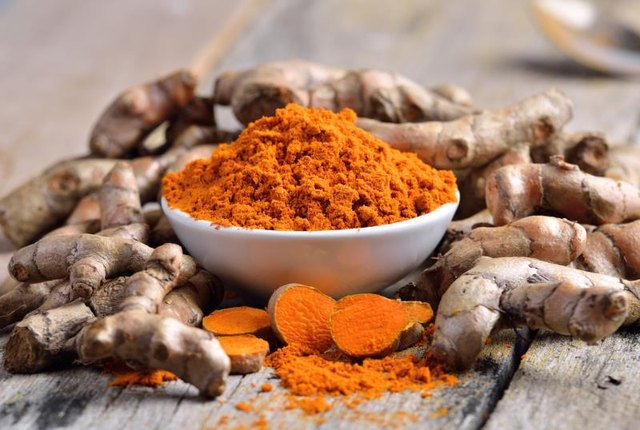
Black pepper and turmeric are aromatic spices that not only add unique flavors to food but also have a variety of health benefits. Turmeric, Curcuma Ionga, is a member of the ginger family and one of the main spices in curry, which is a blend of herbs commonly used in Indian and Asian cuisine. Black pepper, Piper nigrum, comes from an evergreen climbing vine and used in cuisine worldwide.
Pain Reliever
Black pepper contains piperine, a chemical similar to capsaicin found in hot chili peppers. Piperine helps to reduce pain, triggering transient receptor potential vanilloid type 1, TRPV1, receptors in your body, which respond to counteract pain, according to an article published in the October 2010 issue of “Molecular Pain.” Piperine extracted from black pepper is combined with other emollients and natural ingredients into an analgesic cream that is applied to your skin at the site of pain.
Anti-Inflammatory
Curcumin is the yellow pigment in turmeric used for coloring and flavoring. Curcumin is also an effective anti-inflammatory used as a treatment for rheumatoid arthritis, RA, and as a complementary treatment for ulcerative colitis, UC, according to a review published in the December 2010 issue of “Surgical Neurology International.” Turmeric powder is taken three times daily to help reduce swelling and inflammation around the joints. Turmeric extract is another alternative treatment for RA. A solution containing 94 percent of the three major curcuminoids was found effective at preventing arthritis when taken before the onset of joint inflammation, notes a study published in the March 2006 issue of “Journal of Natural Products.”
Peptic Ulcer Benefits
Turmeric and black pepper may have beneficial effects on gastric mucosal damage, peptic ulcer, according to a review in the June 2010 issue of the “World Journal of Gastroenterology.” Curcumin inhibits the growth of all strains of the H. pylori bacteria, which is associated with peptic ulcer disease. The protective effect of piperine in black pepper is linked to its antioxidative effects. Both black pepper and turmeric have antioxidant constituents; however, when taken consistently in large doses, they can cause stomach upset and may induce stomach acid secretion.
Improved Memory Performance
Both black pepper and turmeric show benefits in helping to protect against cognitive impairment and may help improve memory in Alzheimer’s disease. Male Wistar rats given piperine from black pepper over a two-week period showed a significant improvement in memory impairment, according to a study published in the March 2010 issue of “Food and Chemical Toxicology.” Curcumin in turmeric may help reduce memory loss in Alzheimer’s patients. One study on mice with the human Alzheimer's disease gene fed mice a no-dose curcumin diet, low-dose curcumin diet or a high-dose curcumin diet over six months, according to a review published in the April 2005 issue of “Current Alzheimer Research.” Both the low-dose and high-dose curcumin-fed mice showed reduced genetic factors of age-related memory loss. Further research is needed in human Alzheimer’s disease patients to provide conclusive results.
www.livestrong.com




No comments:
Post a Comment